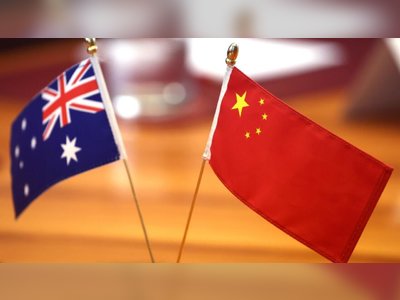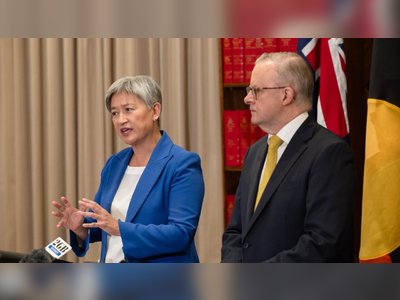
Australia's Defence Strategy: Navigating Alliances and Dependencies
A historical perspective on Australia’s evolving security ties with the US and the implications of the AUKUS agreement amidst rising geopolitical tensions.
Australia’s defense strategy has come under scrutiny as the geopolitical landscape shifts, particularly following the formation of the AUKUS agreement, which aims to enhance security collaboration between Australia, the United States, and the United Kingdom.
This trilateral partnership, established in 2021, involves Australia acquiring eight nuclear-powered submarines at a projected cost of over 300 billion dollars, signaling a significant investment into military capabilities amid concerns over regional security threats.
Historically, Australia’s security ties have evolved significantly since the early 20th century.
The relationship with the United States solidified during World War I, notably marked by joint operations such as the Battle of Hamel in 1918. This marked the first time American troops fought under Australian command, illustrating the early foundations of military cooperation.
During World War II, the dynamics of Australia’s alliances shifted dramatically.
As Japan expanded its influence in the Pacific, Australia’s reliance on the United States deepened.
Prime Minister John Curtin’s 1942 radio address to the American public highlighted Australia as a critical front in the fight against Japanese expansion, emphasizing the need for American support.
The formalization of the ANZUS treaty in 1951 further cemented Australia’s defense relationship with the US, mandating mutual consultations regarding security threats.
However, the treaty lacks the binding obligation characteristic of NATO agreements, raising questions about the level of American commitment in various security scenarios.
In subsequent decades, Australia's defense posture increasingly favored American alliance over British ties, particularly during conflicts such as the Vietnam War when Australia participated in American-led operations.
The 9/11 attacks in 2001 marked a pivotal moment, activating the ANZUS treaty, leading to Australia’s involvement in Afghanistan alongside US forces.
Australia has maintained a record of fighting with the US in every major modern conflict, reinforcing the perception of a robust defense alliance.
However, Australia has sometimes faced limitations in collaboration, as seen during the East Timor crisis in the late 1990s, when US support was more restrictive than anticipated despite Australia leading peacekeeping missions.
Today, Australia's military cooperation with the US encompasses joint training, intelligence sharing, and the hosting of US military bases, notably the Pine Gap facility.
Nevertheless, the geopolitical climate is increasingly complex.
Several regional tensions, particularly related to China’s rising influence, have heightened Australia’s security concerns, prompting closer defense ties with the US through agreements such as AUKUS.
Analysts underscore the asymmetry within the AUKUS partnership, as the United States possesses a defense budget significantly larger than Australia’s, raising apprehensions regarding the implications of relying heavily on American strategic support.
The agreement has sparked debates within Australia regarding its implications for national sovereignty and military strategy.
Despite the dominant alliance with the US, Australia has also been diversifying its security partnerships, highlighting existing ties with nations such as New Zealand, Japan, and India.
Australia’s involvement in multilateral security frameworks, such as the Quad and Five Eyes intelligence network, further illustrates its efforts to establish a broader security strategy beyond its reliance on the United States.
The current geopolitical landscape presents challenges for Australia, as the country navigates its security partnerships while addressing its economic dependence on China.
The evolving relationships with regional powers like India, Japan, and South Korea reflect a strategic intent to balance its security needs with economic realities.
As Australia confronts an increasingly uncertain regional security environment, the implications of its historical ties and current agreements will likely continue to prompt discussion and reassessment of its defense strategy.
This trilateral partnership, established in 2021, involves Australia acquiring eight nuclear-powered submarines at a projected cost of over 300 billion dollars, signaling a significant investment into military capabilities amid concerns over regional security threats.
Historically, Australia’s security ties have evolved significantly since the early 20th century.
The relationship with the United States solidified during World War I, notably marked by joint operations such as the Battle of Hamel in 1918. This marked the first time American troops fought under Australian command, illustrating the early foundations of military cooperation.
During World War II, the dynamics of Australia’s alliances shifted dramatically.
As Japan expanded its influence in the Pacific, Australia’s reliance on the United States deepened.
Prime Minister John Curtin’s 1942 radio address to the American public highlighted Australia as a critical front in the fight against Japanese expansion, emphasizing the need for American support.
The formalization of the ANZUS treaty in 1951 further cemented Australia’s defense relationship with the US, mandating mutual consultations regarding security threats.
However, the treaty lacks the binding obligation characteristic of NATO agreements, raising questions about the level of American commitment in various security scenarios.
In subsequent decades, Australia's defense posture increasingly favored American alliance over British ties, particularly during conflicts such as the Vietnam War when Australia participated in American-led operations.
The 9/11 attacks in 2001 marked a pivotal moment, activating the ANZUS treaty, leading to Australia’s involvement in Afghanistan alongside US forces.
Australia has maintained a record of fighting with the US in every major modern conflict, reinforcing the perception of a robust defense alliance.
However, Australia has sometimes faced limitations in collaboration, as seen during the East Timor crisis in the late 1990s, when US support was more restrictive than anticipated despite Australia leading peacekeeping missions.
Today, Australia's military cooperation with the US encompasses joint training, intelligence sharing, and the hosting of US military bases, notably the Pine Gap facility.
Nevertheless, the geopolitical climate is increasingly complex.
Several regional tensions, particularly related to China’s rising influence, have heightened Australia’s security concerns, prompting closer defense ties with the US through agreements such as AUKUS.
Analysts underscore the asymmetry within the AUKUS partnership, as the United States possesses a defense budget significantly larger than Australia’s, raising apprehensions regarding the implications of relying heavily on American strategic support.
The agreement has sparked debates within Australia regarding its implications for national sovereignty and military strategy.
Despite the dominant alliance with the US, Australia has also been diversifying its security partnerships, highlighting existing ties with nations such as New Zealand, Japan, and India.
Australia’s involvement in multilateral security frameworks, such as the Quad and Five Eyes intelligence network, further illustrates its efforts to establish a broader security strategy beyond its reliance on the United States.
The current geopolitical landscape presents challenges for Australia, as the country navigates its security partnerships while addressing its economic dependence on China.
The evolving relationships with regional powers like India, Japan, and South Korea reflect a strategic intent to balance its security needs with economic realities.
As Australia confronts an increasingly uncertain regional security environment, the implications of its historical ties and current agreements will likely continue to prompt discussion and reassessment of its defense strategy.
AI Disclaimer: An advanced artificial intelligence (AI) system generated the content of this page on its own. This innovative technology conducts extensive research from a variety of reliable sources, performs rigorous fact-checking and verification, cleans up and balances biased or manipulated content, and presents a minimal factual summary that is just enough yet essential for you to function as an informed and educated citizen. Please keep in mind, however, that this system is an evolving technology, and as a result, the article may contain accidental inaccuracies or errors. We urge you to help us improve our site by reporting any inaccuracies you find using the "Contact Us" link at the bottom of this page. Your helpful feedback helps us improve our system and deliver more precise content. When you find an article of interest here, please look for the full and extensive coverage of this topic in traditional news sources, as they are written by professional journalists that we try to support, not replace. We appreciate your understanding and assistance.











